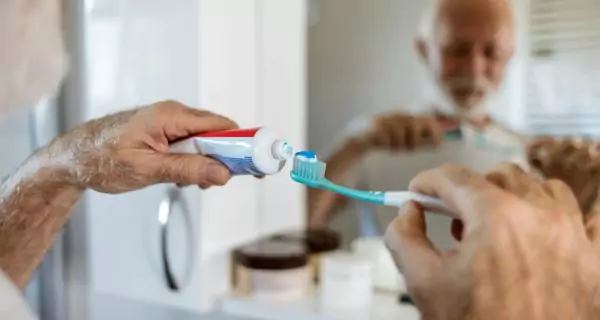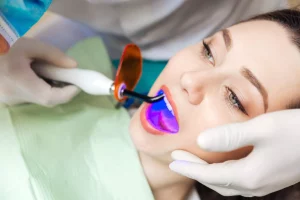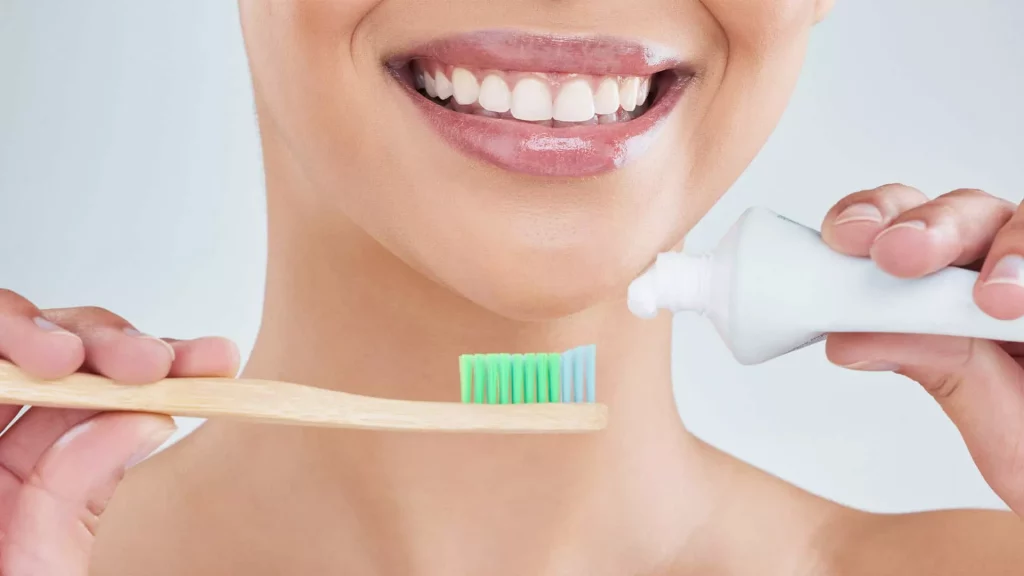Last Updated on: 13th November 2025, 07:00 am
Have you ever helped a loved one brush their teeth, only to see confusion in their eyes or gentle resistance in their hands? Caring for someone with Alzheimer’s is full of moments like these: simple tasks that once took minutes now require patience, love, and creativity.
As memory fades, routines like brushing or flossing are often forgotten, making oral care a real challenge. Yet, keeping the mouth clean is essential. Good oral hygiene helps prevent pain, infections, and difficulties with eating or speaking, which can have a profound impact on comfort and mood.
Whether your loved one is in the early or advanced stages of Alzheimer’s, there are ways to support their well-being. In this article, we’ll share practical, gentle tips to help caregivers manage oral hygiene with confidence and compassion.
The connection between Alzheimer’s and oral health

Alzheimer’s is a progressive disease, which means it gradually affects a person’s memory, thinking, and ability to perform daily tasks.
How Alzheimer’s affects daily oral care
As the disease progresses, routines like brushing and flossing become confusing or frustrating. Many people need more support as time goes on.
Common challenges include:
- forgetting how to use a toothbrush or floss
- not recognizing dental products
- not understanding what the caregiver is doing
- becoming uncooperative or anxious during oral care
- losing physical coordination for brushing or rinsing
Why oral health matters in Alzheimer’s
Keeping the mouth clean is more than just a daily task; it’s essential to avoid pain, discomfort, and serious health issues.
Neglecting oral hygiene can lead to:
- gum disease and tooth decay
- pain when eating, chewing, or speaking
- changes in behavior, such as agitation or refusal to eat
- increased risk of oral and general infections
The link between Alzheimer’s and oral health is clear: as the disease progresses, taking care of the mouth becomes harder, but just as necessary. Without proper care, small dental issues can quickly turn into bigger health problems.
Signs of oral health problems in Alzheimer’s patients

People living with Alzheimer’s may not be able to express pain or discomfort clearly. Caregivers must stay alert to visible changes in the mouth and unusual behaviors that could point to dental pain or discomfort.
What you can see in the mouth (physical signs)
Look inside the mouth regularly and check for:
- swollen or bleeding gums: often a sign of gum disease
- redness or sores: may indicate irritation or infection
- bad breath: points to decay or poor hygiene
- cavities or broken teeth: can cause pain and difficulty eating
- dry mouth: common due to medications and increases the risk of decay
- facial swelling: might suggest an abscess or infection
- grinding or clenching teeth: often a reaction to pain
Changes in behavior or mood (emotional/physical clues)
Sometimes, the mouth looks fine, but behaviors tell another story. Pay attention to:
- refusal to eat or chew: especially foods that were once enjoyed
- pulling at the face or jaw: a common sign of oral discomfort
- sudden aggression, agitation, or crying: could be linked to pain
- trouble sleeping or restlessness: may stem from undetected dental issues
- touching or rubbing the mouth area constantly
- avoiding brushing or resisting care: possibly due to fear, confusion, or pain
If you notice any of these signs, especially if they appear suddenly, consider scheduling a dental checkup. Catching problems early can prevent bigger health issues and ease discomfort.
Daily oral hygiene tips for caregivers

Caring for someone with Alzheimer’s includes more than helping with meals or medications; it also means protecting their smile. As memory fades and coordination declines, daily mouth care can become increasingly difficult.
With patience and the right strategy, caregivers can make oral care routines simpler and less stressful for everyone involved.
Build a daily routine
Keeping things consistent can reduce stress and foster cooperation.
- brush and floss at the same time each day (e.g., after breakfast and before bed)
- use short, simple instructions: “Hold the toothbrush,” “Brush your teeth.”
- demonstrate actions if the person is unsure of what to do
- stay calm, even if they resist, and try again later in a quiet space
Use the right tools
Choosing gentle and easy-to-use items can make oral care more comfortable:
- use a soft-bristled or child-sized toothbrush
- choose fluoride toothpaste for extra protection
- in later stages, consider foam swabs if brushing is no longer possible
- clean dentures daily and check for sore spots
Encourage hydration
Dry mouth is common due to medications or reduced fluid intake:
- offer water regularly
- limit sugary or acidic drinks
- ask a dentist about saliva substitutes if needed
Adapt as the disease progresses
As Alzheimer’s advances, the level of help needed will increase:
- in the early stages: supervise or offer small reminders
- in the middle to late stages: take a hands-on role with daily brushing and care
- be flexible and patient, some days will be harder than others
Supporting daily oral hygiene is one of the simplest but most powerful ways to protect the health, comfort, and dignity of someone living with Alzheimer’s.
To handle it well, it’s important to pay attention. Watch closely for changes in the mouth, like swelling or sores, but also in behavior – like the refusal to eat or sudden agitation.
Small signs often speak louder than words. By noticing them early, caregivers can adapt their approach and offer more effective, gentle care at every step of the way.
The role of the Dentist in Alzheimer’s care

Dentists play a key role in helping people with Alzheimer’s maintain a healthy mouth, something that becomes harder as the disease progresses.
From early preventive care to specialized treatment in later stages, dental support can make a real difference in comfort and quality of life.
When to visit the Dentist
It’s a good idea to schedule a dental visit as soon as Alzheimer’s is diagnosed or during the early stages of the disease. At this point, the person is usually more cooperative, and the dentist can:
- apply fluoride treatments
- perform cleanings
- fix cavities or broken teeth
- create a personalized long-term care plan
Early care helps avoid future problems and keeps the mouth healthy as the disease progresses.
It’s important to stay alert to any changes in the mouth, gums, or behavior that might signal a problem.
Don’t wait for a dental emergency. Seeing the dentist early and regularly helps prevent pain, reduces complications, and supports a better quality of life for both the person with Alzheimer’s and their caregivers.
How Dentists help Alzheimer’s patients

Dentists experienced in caring for Alzheimer’s patients know how to adapt their approach. They focus on reducing stress and keeping the person as comfortable as possible.
What to expect during visits
- shorter, more frequent appointments
- a calm environment with clear, simple explanations
- encouraging a familiar caregiver to stay present
- close communication with family or care staff
In some cases, if office visits become too difficult, home dental care (domiciliary care) may be available.
Tips for a successful appointment
Taking someone with Alzheimer’s to the dentist may seem daunting, but with preparation, the process can be easier.
- Book appointments during the calmest time of day (often mornings).
- Use reassuring, simple language: explain what will happen in basic steps.
- Bring a list of medications and any concerns.
- Stay with them during the appointment for comfort.
Long-term oral care planning
As Alzheimer’s progresses, dental needs and routines must adapt. It’s important to have a plan in place with the help of a dentist.
Discuss with the dental team:
- options for preventive extractions (removing teeth likely to cause future problems)
- more frequent checkups as routines decline
- sedation or anesthesia for advanced cases, but only if needed and safe
- residential care coordination, ensuring staff support oral hygiene daily
If the person moves into a care home, share their dental history and routine with the staff. Ask about:
- access to a regular or visiting dentist
- whether there’s a trained oral care champion on staff
- the option to continue helping with brushing during visits
Dentists aren’t just there to fix teeth; they’re an important part of the care team. Their support, especially early on, will help prevent pain and protect the dignity of someone living with Alzheimer’s.
Conclusion
Alzheimer’s and oral health are deeply connected, and neglecting dental care can lead to serious physical and emotional complications. Caregivers must stay vigilant, prioritize hygiene routines, and seek regular dental support.
If you’re caring for someone with Alzheimer’s, don’t hesitate to contact a dental professional. A healthy mouth can improve comfort, nutrition, and overall quality of life, no matter the stage of the disease.
Frequently Asked Questions (FAQ)
References
1. Alzheimer’s Society. (n. d). Dental and mouth care. Alzheimer’s Society. https://www.alzheimers.org.uk/get-support/daily-living/dental-mouth-care
2. Daly, B., Thompsell, A., Sharpling, J., Rooney, Y. M., Hillman, L., Wanyonyi, K. L., White, S., & Gallagher, J. E. (2017). Evidence summary: the relationship between oral health and dementia. BDJ, 223(11), 846–853. https://doi.org/10.1038/sj.bdj.2017.992
3. Gao, S. S., Chu, C. H., & Young, F. Y. F. (2020). Oral Health and Care for Elderly People with Alzheimer’s Disease. International Journal of Environmental Research and Public Health, 17(16), 5713. https://www.mdpi.com/1660-4601/17/16/5713
4. NIA. (2020, 9 July). Large study links gum disease with dementia. National Institute on Aging. https://www.nia.nih.gov/news/large-study-links-gum-disease-dementia
5. Quinn, B. (2022). Stronger connections made between oral health and Alzheimer’s disease. British Dental Journal, 233(7), 527. https://doi.org/10.1038/s41415-022-5136-3














